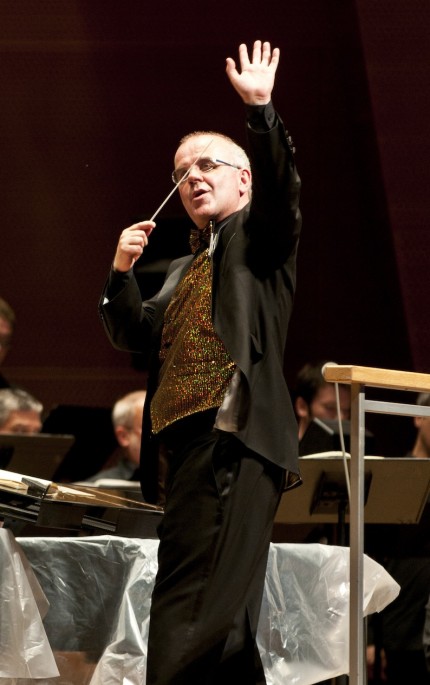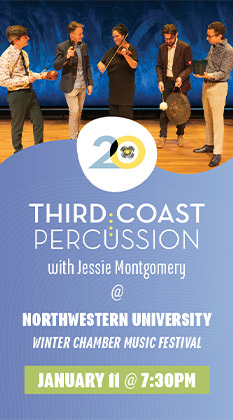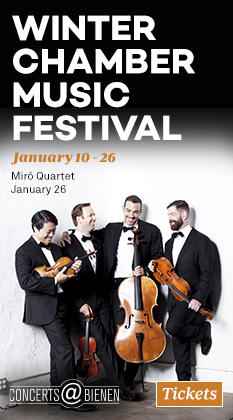Grant Park Chorus takes flight in 50th anniversary program

You know you’re living in a great musical city when Stravinsky’s Les noces is the opening work in a free outdoor summer concert.
The Grant Park Chorus marked its 50th anniversary Friday night at the Pritzker Pavilion in Millennium Park. The offbeat wide-ranging program served as an ideal canvas for the ensemble’s corporate polish and remarkable versatility, led by artistic director Carlos Kalmar and chorus director Christopher Bell.
As noted by chorus member Amy Pickering in opening remarks, the evening required the Grant Park Chorus to sing in Russian, Spanish, Latin, High German and Estonian—all within the space of two hours. That they did so with such power, precision and astounding clarity is a testament to the sterling, decade-long leadership of Bell as well as the greatly gifted singers of the ensemble itself.
Carl Orff’s Carmina Burana was the marquee work on the program but presented in a less familiar guise than usual. Rather than the standard version for large orchestra, Orff’s lusty choral showpiece was heard in a 1956 reduction by his student Wilhem Killmayer for two pianos, timpani, and percussion, an arrangement approved by the composer.
Unavoidably, there are moments—mostly nonvocal passages—where this version sounds awfully bare and rather dull, with Orff’s kaleidoscopic scoring reduced to just a single piano. Still, Friday’s performance, fittingly, threw even more of the spotlight on the Grant Park Chorus and provided a new slant on the work.
Most accounts of Carmina Burana invariably tend to center on primitive dynamism and raucous clamor. Bell, however, led as refined and beautifully sung a performance of this music as one is ever likely to experience. “Intimate” and “elegant” are not words one usually associates with Burana, yet the glowing textures and radiant vocalism of the Grant Park Chorus—with every syllable crystal-clear—made one hear this music in an entirely new light, and closer to the profane 20th-century cantata Orff intended.
Still, there was no lack of sonic impact in the impassioned moments, with Bell drawing a wide dynamic range that expanded thrillingly in the penultimate Ave formosissima section. The young singers of the Anima Children’s Chorus contributed their flexible, bell-like tones to the Court of Love passages.
The three soloists, all Grant Park Chorus members, acquitted themselves well. Mary Elizabeth Mackenzie’s voice is on the light side but has the requisite youthful purity and she delivered a lovely In trutina.
Bass Daniel Eifert could have been a bit more characterful in his moments as the bibulous abbot and the abandoned lover, where he was also stretched at the top of his range. Still, Eifert has an attractive, firmly focused voice and sang with poised expression. Peder Rieff’s plangent high tenor was ideally suited to the slow-roasted swan. The two superb, hard-working pianists deserved to be mentioned in the program alongside the vocal soloists.
The primitive theme was also manifest on the first half, led by Kalmar.
Stravinsky’s Les noces (The Wedding) is a kind of less pagan choral counterpart to The Rite of Spring. Scored for unpitched percussion and four pianos, the “dance cantata” is imbued with a similar sense of malign percussive rawness and evokes the peasant harshness of old Russia.
Kalmar led a propulsive performance that put across the pungent folk flavor and mechanistic primal drive to unsettling impact. Four chorus members (soprano Saira Frank, mezzo Sarah Ponder, tenor Hoss Brock and bass Thomas Hall) proved first-class soloists, and the chorus brought unflagging energy and intense declamation to Stravinsky’s incantatory vocal lines.
Brock and Hall were also featured prominently in Veljo Tormis’s Raua needmine, written in 1972. The Estonian composer’s “Curse Upon Iron” is a deeply felt work, depicting how the shamanic properties of iron can be turned by man against himself when the metal is mined for machines of violence and war rather than for peaceful and constructive ends.
Raua needmine is an extraordinary work, cast in a distinctive style. Accompanied by a drum, the two male soloists declaim violently against the chorus’s restless, undulating backdrop. Tormis’s choral writing is full of unusual effects, as when the two male voices suddenly sharply descend as the chorus’s sopranos unleash a series of high notes that sound uncannily like an air-raid siren. Kalmar led a stunning performance that brought out all the primitive, chant-like qualities of this music. The two male soloists were terrific with Brock in particular spitting out his angry lines with venomous relish (“Fie upon you, evil iron!”).
Next to the Stravinsky and Tormis works, Eric Whitacre’s music sounded even more benign than usual, though the soothing tonal textures of his Cloudburst provided a respite from the edgier music. Even with Whitacre’s shimmering choral textures against high percussion and chimes, the composer spices his Octavio Paz setting with the chorus called upon to clap and snap their fingers in the dynamic swells, seemingly ad libitum, which adds a striking sonic texture, like waves lapping on a beach.
The program will be repeated 7:30 p.m. Saturday at the Pritzker Pavilion. Admission is free. grantparkmusicfestival.com
Posted in Performances



Posted Jul 03, 2012 at 11:05 pm by Alexander Platt
How glorious! And what a great statement on classical music in Chicago.